You found our list of the best international business books.
International business books are publications that provide insights into the complexities of conducting business in global economies. Examples include Globalization and its Discontents by Joseph E. Stiglitz, The Value of Everything by Mariana Mazzucato, and The World for Sale by Javier Blas and Jack Farchy. The purpose of these books is to educate individuals on the opportunities and challenges of trade in different countries. These resources also provide information on competitive advantages businesses can get in new markets and emerging global trends.
These examples are similar to business books, entrepreneur books, and business ethics books. These resources can help readers understand business factors like remote work trends and executive skills and competencies.
This list includes:
- international business reference books
- international business management books
- books on international business
Here we go!
List of international business books
International business books are some of the best resources for individuals who want to expand their entrepreneurial knowledge of global economies. From When Cultures Collide by Richard D. Lewis to The Travels of A T-Shirt in the Global Economy by Pietra Rivoli, here is a list of the best books that provide insights into international business.
1. The Culture Map: Breaking Through the Invisible Boundaries of Global Business by Erin Meyer
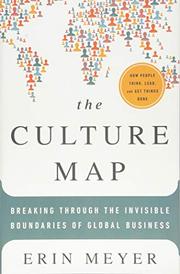
The Culture Map tops the list of books on international business. Eric Meyer argues that business success requires tactical skills to navigate cultural differences and decode foreign cultures. The publication provides readers with a field-tested model that explains the impact of cultural differences on international businesses. Meyer also combines an analytical framework with actionable and practical advice that individuals can apply in their global firms. Some of the topics that The Culture Map covers are leadership, communication, persuasion, trust, and performance evaluation.
Notable quote: ”Think carefully about your larger objectives before you mix cultures up. If your goal is innovation or creativity, the more cultural diversity the better, as long as the process is managed carefully. But if your goal is simple speed and efficiency, then monocultural is probably better than multicultural. Sometimes, it is simply better to leave Rome to the Romans.”
Read The Culture Map.
2. Shoe Dog: A Memoir by the Creator of Nike by Phil Knight

One of the most effective ways to learn about international business operations is through established brands. In Shoe Dog, readers can learn the inside story of Nike, from major losses to successes. The book also entails the company’s journey into one of the most profitable brands globally. In addition, readers will get valuable insights into navigating legal battles and maintaining innovative global businesses.
Notable quote: ”People reflexively assume that competition is always a good thing, that it always brings out the best in people, but that’s only true of people who can forget the competition.”
Read Shoe Dog.
3. Globalization and its Discontents by Joseph E. Stiglitz
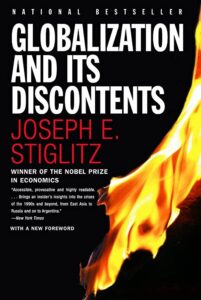
Globalization and its Discontents provides a detailed history of macroeconomic players across the world. Joseph E. Stiglitz argues that financial institutions, businesses, and insurance companies base their operations on social mores and beliefs. The Nobel Prize winner and renowned economist takes readers through major economic events in past decades. The author discusses interesting events that affect global enterprises, such as the International Monetary Fund’s focus on growing Wall Street instead of poorer countries.
Notable quote: ”Decisions were often made because of ideology and politics. As a result, many wrong-headed actions were taken, ones that did not solve the problem at hand but that fit with the interests or beliefs of the people in power.”
Read Globalization and its Discontents.
4. When Cultures Collide: Leading Across Cultures by Richard D. Lewis
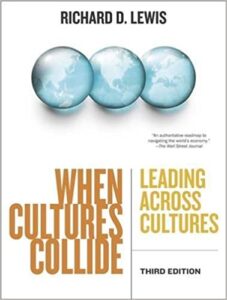
When Cultures Collide entails diverse thought processes from leaders worldwide, both in personal lives and business settings. The book takes a systematic approach and divides cultures into linear-active, multi-active, and reactive cultures. Richard Lewis argues that international businesses can gain a competitive advantage by strategically handling cultural differences. The publication also provides handy tips to help global business managers be culturally sensitive. When Cultures Collide is also an excellent resource for entrepreneurs who want to master intercultural communication.
Notable quote: ”Stereotyping is dangerous, but generalizing is a fair guide at the national level.”
Read When Cultures Collide.
5. The Investor’s Manifesto: Preparing for Prosperity, Armageddon, and Everything in Between by William J. Bernstein
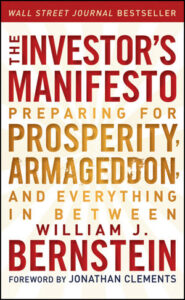
The Investor’s Manifesto is an excellent choice of international business management books. William Bernstein uses the current market to provide in-depth insights and practical tips in the investment industry. The author discusses the relationship between risk and return and how entrepreneurs can find a profitable equilibrium between the two. Readers will also get insights into stocks and bonds, market efficiency, and financial freedom. The Investor’s Manifesto focuses on equipping readers with tips to identify and avoid worst-case scenarios and plan investment decisions wisely.
“Never forget that the portfolio’s the thing: Inevitably, it will contain poorly performing asset classes—there will always be at least one—but its identity will change from year to year.”
Read The Investor’s Manifesto.
6. The Lean Startup: How Today’s Entrepreneurs Use Continuous Innovation to Create Radically Successful Businesses by Eric Ries
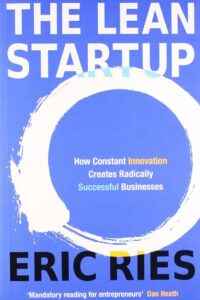
One of the major reasons startups fail is mismanagement and the lack of innovation. The Lean Startup provides strategies that businesses can use to prevent these failures. For instance, global entities will learn new product launch approaches and create successful entities, even when operating in a business environment of extreme uncertainty. Businesses will also learn how to boost efficiency by leveraging human creativity, shortening production cycles, and providing what customers really want. The author focuses on enabling companies to adapt and adjust to diverse market conditions before it is too late.
Notable quote: ”Success is not delivering a feature; success is learning how to solve the customer’s problem.”
Read The Lean Startup.
7. The Fourth Industrial Revolution by Klaus Schwab

Authored by a world-renowned economist, The Fourth Industrial Revolution provides insights for global businesses. Klaus Schwab argues that the fourth industrial revolution will affect human beings’ lives and work. The author states that the revolution is different in scope, scale, and complexity compared to past events. The revolution features new technologies fusing the digital, physical, and biological worlds and the effects on industries, economies, and governments. Schwab outlines the revolution’s major impact on businesses, individuals, governments, and civil society. Readers will grasp ideas on how to leverage changes and progress society rather than experience dire disruptions.
Notable quote: ”This work indicates that the fourth industrial revolution is unique, driven as it is by a global network of smart (network-driven) cities, countries, and regional clusters.”
Read The Fourth Industrial Revolution.
8. Geopolitical Alpha: An Investment Framework for Predicting the Future by Marko Papić
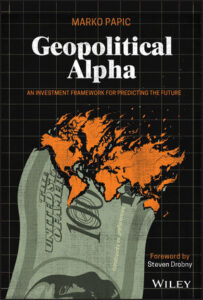
Geopolitical Alpha is one of the best international business reference books for readers who want to predict market trends. Marco Papić provides resources that will help investors pinpoint the media-hyped narratives. The investment strategist also touches on the material constraints that face policymakers using past decade data. Papić then argues that investors should focus on preferences and not constraints. The author uses a sense of humor to amplify the lessons. Geopolitical Alpha is a perfect read for C-suite executives, investment professionals, and individuals interested in economics, geopolitics, and finance.
Notable quote: ”Preferences are optional and subject to constraints, whereas constraints are neither optional nor subject to preferences.”
Read Geopolitical Alpha.
9. The Personal MBA: Master the Art of Business by Josh Kaufman
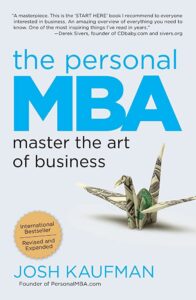
If you want to master the art of business, then The Personal MBA is an excellent pick. Josh Kaufman takes a unique approach to teaching business and deviates from the usual profit-and-loss statements or PowerPoint presentations. Instead, the book focuses on the core principles of business and teaches principles that would take a lifetime to master. The Personal MBA touches on business principles, psychological principles, human behavior, and systems.
Notable quote: ”Every successful business (1) creates or provides something of value that (2) other people want or need (3) at a price they’re willing to pay, in a way that (4) satisfies the purchaser’s needs and expectations and (5) provides the business sufficient revenue to make it worthwhile for the owners to continue operation.”
Read The Personal MBA.
10. The Value of Everything: Making and Taking in the Global Economy by Mariana Mazzucato
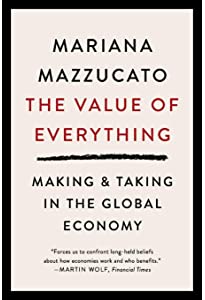
The Value of Everything is a fantastic choice of books on international business. Mariana Mazzucato argues that economies reward activities that extract instead of those that create value. The author also scrutinizes the global economy based on the current financial systems. For example, Mazzucato uses big pharma and Silicon Valley case studies to show the role of rent and profits in measuring growth and GDP. The Value of Everything also includes lessons that investors can use as they take on global markers. For instance, the author states that leaders need to rethink the role of public policy and the public sector to boost long-term economic growth.
Notable quote: ”Policy is not just about ‘intervening’. It is about shaping a different future: co-creating markets and value, not just ‘fixing’ markets or redistributing value. It’s about taking risks, not only ‘de-risking’.”
Read The Value of Everything.
11. The World for Sale: Money, Power and the Traders Who Barter the Earth’s Resources by Javier Blas and Jack Farchy
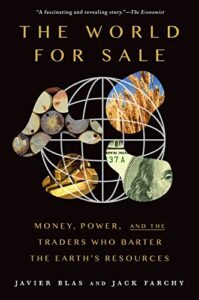
The World for Sale provides exciting insights into global trade. Leading journalists Javier Blas and Jack Farchy offer untold tales on some of the most hidden corners of the economy. Throughout the book, readers get insights into how billionaire commodities work and individuals who hoard and sell the earth’s free resources. The authors also explore how businesspersons become indispensable by enabling the expansion of international trade through global financial markets. The World for Sale is also an eye-opener for the wildest frontiers of the global economy, including some of the most influential individuals.
Notable quote: ”What matters to them is the price disparity—between different locations, different qualities or forms of a product, and different delivery dates. By exploiting these price differences, they help to make markets more efficient, directing resources to their highest value uses in response to price signal.”
Read The World for Sale.
12. The Travels of A T-Shirt in the Global Economy: An Economist Examines the Markets, Power, and Politics of World Trade by Pietra Rivoli
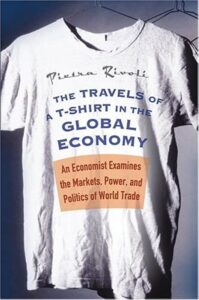
The Travels of A T-Shirt in the Global Economy takes readers through economic, political, and ethical factors that affect global businesses. Pietra Rivoli uses the analogy of the life story of the travels of a T-shirt to illustrate the relationship between business and globalization. The author travels to diverse global destinations, including an African clothing market, a Chinese factory, and a Texas cotton field. The book uses an entertaining yet enlightening approach to teach major business lessons in areas like manufacturing, recycling, and upcoming trends.
Notable quote: ”How did the Farm Bill achieve overwhelming support from Congress in the face of such widespread calls for reform? In exchange for leaving support for the large commodity crop farmers in place, House and Senate negotiators packaged support for nearly everyone else into the bill.”
Read The Travels of A T-Shirt in the Global Economy.
13. Currency Wars: The Making of the Next Global Crisis by James Rickards
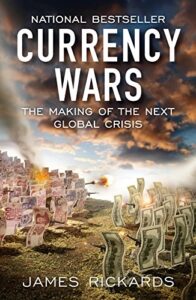
With currency conflicts being one of the most destructive outcomes in international business, Currency Wars is a commendable read for global investors. The book provides the history of currency wars in the past century. James Rickards highlights issues such as the collapse of paper currencies, the imposition of capital controls, the gold freeze, and the confiscation of gold. With the recent manipulation of the Chinese currency and the debasement of the dollar, the author also argues that the next crash is overdue. Thus, every global investor must take measures to avoid impending currency disasters. The book unveils the arrogance driving public policies and provides an effective and informed course of action.
Notable quote: ”Hyperinflation produces fairly predictable sets of winners and losers and prompts certain behaviors and therefore can be used politically to rearrange social and economic relations among debtors, creditors, labor and capital, while gold is kept available to clean up the wreckage if necessary.”
Read Currency Wars.
14. A Splendid Exchange: How Trade Shaped the World from Prehistory to Today by William J. Bernstein
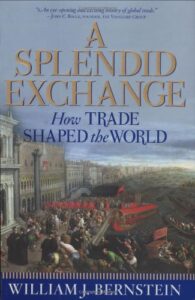
If you want to learn the history of trade, then A Splendid Exchange is a great resource. The book details trade’s history from 3000 BC to the current practices. William Bernstein provides insights into trade’s contentious and colorful past. The author touches on aspects such as protectionism, the power of corporations on market influence, and free trade. The book also provides insights into trade’s social, cultural, and political aspects.
Notable quote: ”Our urge to trade has profoundly affected the trajectory of the human species. Simply by allowing nations to concentrate on producing those things that their geographic, climatic, and intellectual endowments best enable them to do, and to exchange those goods for what is best produced elsewhere, trade has directly propelled our global prosperity.”
Read A Splendid Exchange.
15. Basic Economics: A Citizen’s Guide to the Economy by Thomas Sowell
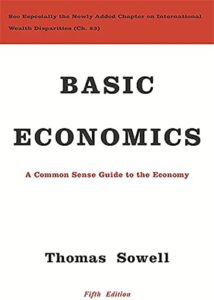
If you are looking for international business management books, then Basic Economics is an excellent pick. In the resource, Thomas Sowell uses simple real-life examples to guide readers on how the economy works. The author also reveals general principles enabling individuals to critique economic policies worldwide. For instance, Sowell touches on areas that can affect the success of international businesses, such as rent control and international balance of payments. The author also talks about the effects of government interference on free markets and the influence of price systems on the success of global ventures.
Notable quote: ”Among the greatest external costs imposed in a society can be those imposed politically by legislators and officials who pay no costs whatever, while imposing billions of dollars in costs on others, in order to respond to political pressures from advocates of particular interests or ideologies.”
Read Basic Economics.
16. Disunited Nations: Succeeding in a World Where No One Gets Along by Peter Zeihan
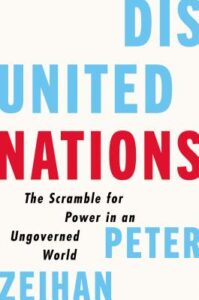
As an investor, the rise and fall of regional powers can make or break investment decisions. Disunited Nations addresses the effects of fading regional powers and their influence on international cooperation. Peter Zeihan, a geopolitical strategist, discusses various counterintuitive arguments about the future of world trade. The author lists emerging shifts in the next two decades and how international investors can navigate the impending chaos.
Notable quote: ”It’s hardly that cultures in nontemperate environments are lazy or less intelligent, but rather that the pressures they face don’t encourage the sorts of technical advancement associated with stronger and more durable states.”
Read Disunited Nations.
17. The World is Flat: A Brief History of the Twenty-first Century by Thomas L. Friedman
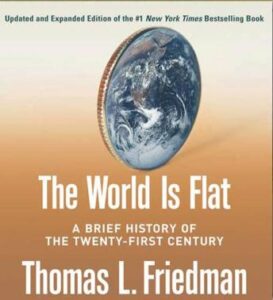
The World is Flat provides interesting insights into international businesses. Thomas Friedman translates complex economic issues and foreign policy into simple language. The author also explains the flattening of the world ideology and what it means for companies, individuals, countries, and communities across the globe. According to Friedman, some forces behind the flattening of the world include informing, offshoring, outsourcing, and supply chaining. The book also discusses the gaps in financial regulation and the effect of the nonexistent fiscal discipline.
Notable quote: ”Every new product—from software to widgets—goes through a cycle that begins with basic research, then applied research, then incubation, then development, then testing, then manufacturing, then deployment, then support, then continuation engineering to add improvements.”
Read The World is Flat.
Conclusion
International business has become increasingly important in today’s globalized world. International business books provide vital insights and knowledge for global enterprises. In addition, these publications are great resources for entrepreneurs who want to dive into global trade or individuals who wish to understand the risks and perks of businesses in diverse locations. Our list of international business books can help you learn the history of trade and tips that can simplify your international ventures.
Next, check out our list of startup books, business ethics books, crowdfunding books, and operations management books.
